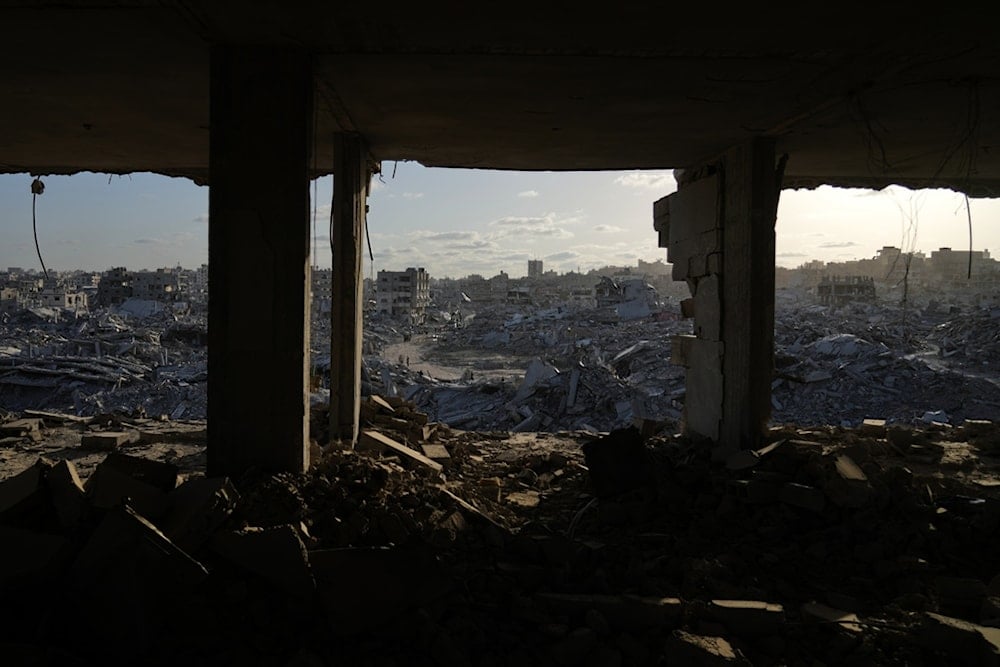Katz orders tunnel demolition plan, sparks fears of ceasefire collapse
"Israel's" Security Minister Israel Katz announces a new military plan directing the IOF to destroy Hamas's tunnel network in Gaza.
-

Displaced Palestinians walk amid destroyed buildings in the heavily damaged Sheikh Radwan neighborhood in Gaza City, Saturday, October 11, 2025. (AP)
Israeli Security Minister Israel Katz has announced plans for a new military operation in Gaza, instructing the Israel Occupation Forces (IOF) to prepare for the destruction of underground tunnels.
In a statement posted on X, Katz said, "The major challenge for Israel after the phase of returning the hostages will be the destruction of all of Hamas's terror tunnels in Gaza, directly by the [IOF] and through the international mechanism to be established under US leadership and supervision."
He claimed that dismantling the tunnels is essential for implementing the ceasefire's clause on "demilitarizing Gaza and disarming Hamas." Katz added that he had "instructed the [IOF] to prepare to carry out the mission."
Observers, however, warn that the announcement represents a clear attempt to expand "Israel's" military control under the pretext of security. The current ceasefire agreement, mediated by the United States, Egypt, and Qatar, explicitly outlines a phased process in which reconstruction, humanitarian access, and political dialogue must precede any disarmament discussions. Unilaterally ordering the destruction of tunnels in areas no longer under Israeli control would therefore constitute a breach of the truce and a violation of international law, analysts warn.
Humanitarian experts warn that renewed operations could jeopardize aid delivery to Gaza's displaced population and risk reigniting large-scale hostilities before the international oversight mechanism envisioned in the ceasefire is even operational.
Subterranean survival
"Israel's" fixation on Gaza's tunnels reflects its continued military occupation and intelligence failures rather than a viable security plan, Palestinian commentators say. In July 2024, even Israeli officials admitted that after nine months of warfare, they still lacked a full understanding of the tunnel network, described by one security source as a "spider's web." The Israeli military's own "Atlantis Project," which sought to flood tunnels with seawater, was ultimately abandoned after failing to achieve its objectives.
A later Washington Post investigation in October 2024 wrote that the Resistance's tunnels, dubbed the "Gaza metro", were not only a military asset but also a means of survival for a besieged population enduring years of blockade and bombardment. The report described how the tunnels enabled the transport of food, medicine, and materials under conditions of total siege, while also serving as shelters for fighters and civilians during Israel's bombing campaigns.
Armed sovereignty
Palestinian Resistance groups, including Hamas and the PIJ, argue that disarmament cannot occur under occupation, insisting that their right to resist is protected under international law until sovereignty and self-determination are achieved. Hamas leaders have rejected any plan requiring them to surrender weapons, calling such demands one-sided and unrealistic given "Israel's" continued military presence and daily violations of the truce.
With reconstruction stalled and nearly two million people still displaced, the latest Israeli announcement raises fears that the ceasefire may once again give way to renewed aggression. Hamas has also confirmed it will not take part in the Sharm el-Sheikh peace summit, dismissing the gathering as symbolic and asserting that any meaningful negotiations must address the root causes of occupation and blockade.
Read more: Trump, el-Sisi to co-chair Gaza peace summit in Sharm el-Sheikh

 3 Min Read
3 Min Read









